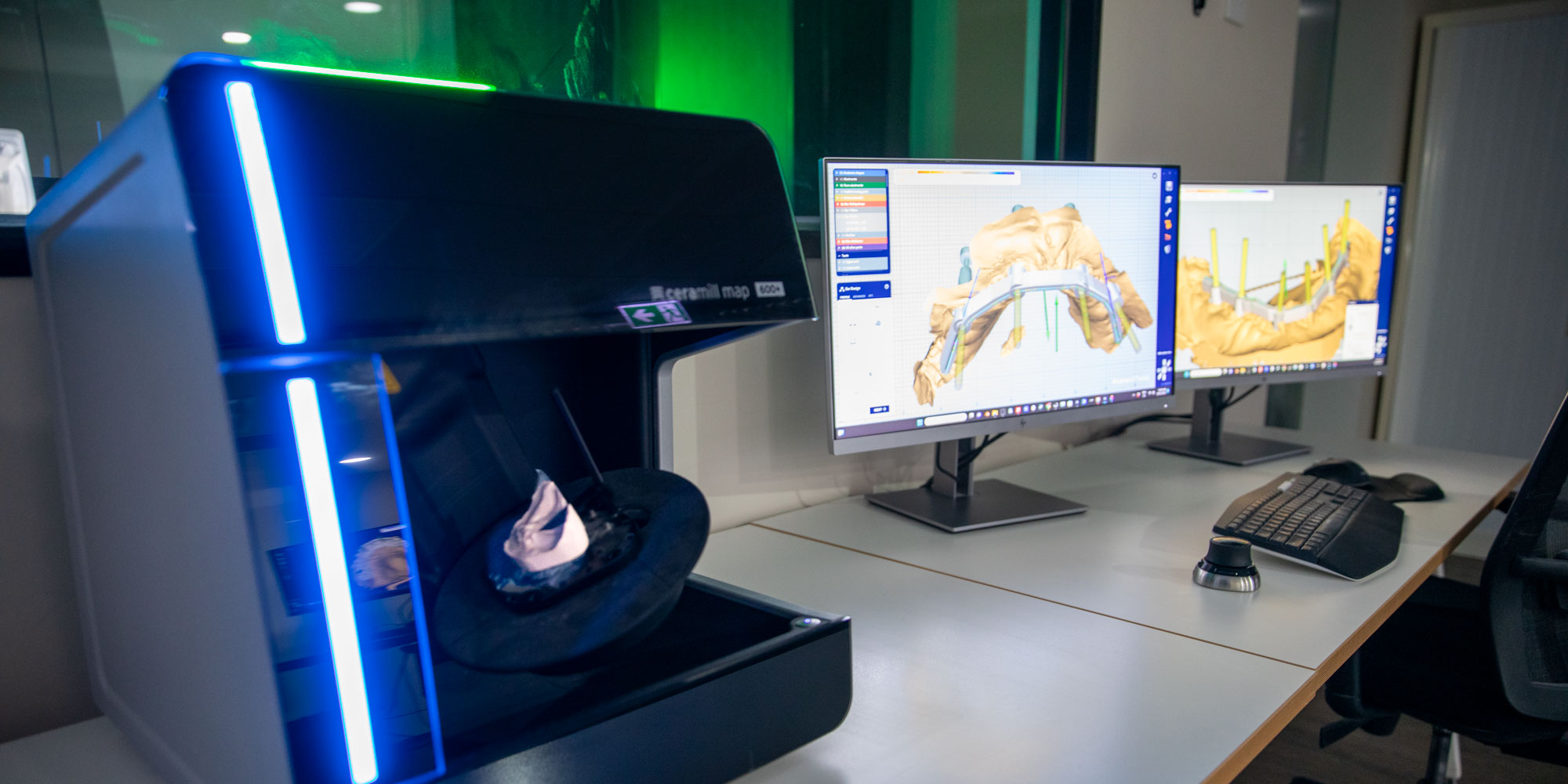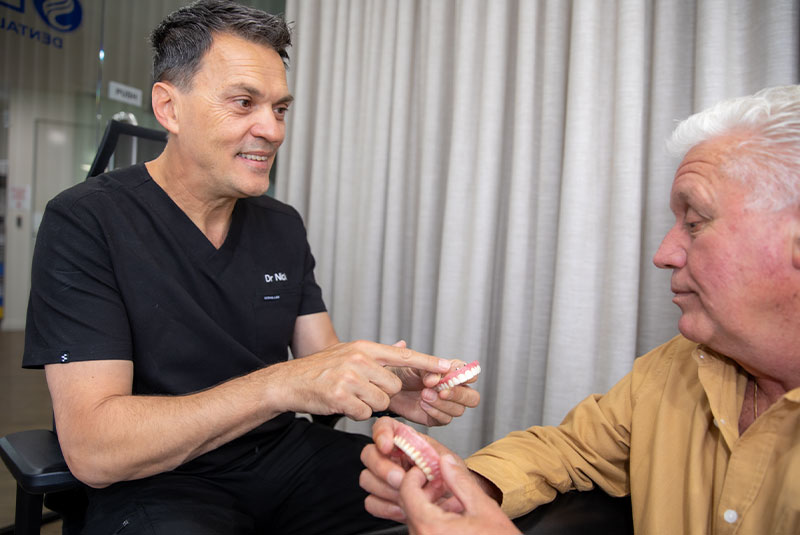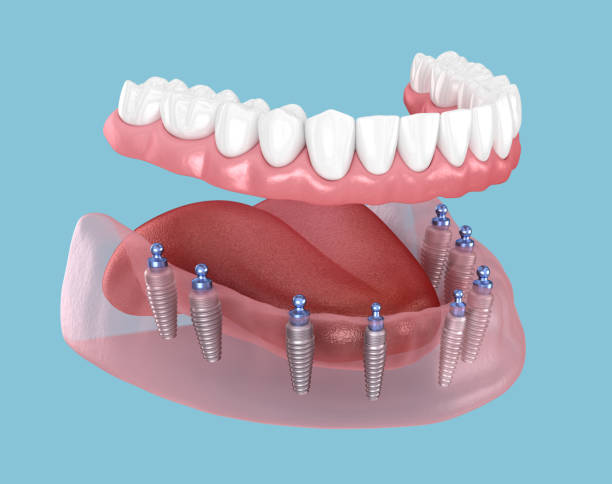
Understanding the Dental Implant Treatment
If you’re considering dental implants, it helps to know exactly what’s involved.
In a nutshell, dental implant treatment is a procedure that replaces missing teeth with strong, natural-looking replacements. Unlike traditional dentures, implants are anchored directly into the jawbone, serving as an artificial tooth root. This process is designed to restore both function and appearance, supporting the jawbone to prevent bone loss.
The treatment typically involves several key stages. It begins with a consultation where your dentist assesses your oral health and creates a personalised treatment plan. Next, if required, preparatory procedures like bone grafting, tooth extraction, or sinus lift may be performed. The titanium implant is then placed into the bone during a surgical procedure, followed by a healing period known as osseointegration, where the bone fuses with the implant.
Once the implant is secure, an abutment is attached, serving as a connector for the final replacement tooth. A custom-made crown, bridge, or denture is then fitted to match the size, shape, and colour of your natural teeth.
However, dental implant treatments are highly personalised, and recovery time can vary depending on individual factors. So, each patient’s journey may vary depending on individual needs. To get a better idea about what to expect for your specific situation, talk to us today. Our experienced team of dental professionals are here to guide you every step of the way.
Common Misconceptions About Dental Implants
Before delving into what to expect from a dental implant procedure, let’s first take a look at the myths and misconceptions surrounding the treatment. As you know, there are several misconceptions about dental implants that can create unnecessary worry or confusion. Here are some of the most common myths and the facts to set the record straight:
Misconception: Dental implants are painful.
Fact: Modern dental implant procedures use advanced techniques and anaesthesia designed to minimise discomfort. Many patients describe the sensation as mild soreness, similar to routine dental work.
Misconception: Implants are too expensive.
Fact: While the upfront cost may seem high, implants are designed as a long-term solution. Unlike dentures or bridges, they don’t need frequent replacements, saving money in the long run.
Misconception: Implants are noticeable and look unnatural.
Fact: Dental implants are custom-made to match the colour, shape, and size of your natural teeth. This helps them blend seamlessly with your smile, making them difficult to distinguish from real teeth.
Misconception: Implants require too much maintenance.
Fact: Caring for dental implants is similar to caring for natural teeth. Regular check-ups, brushing, and flossing are all that’s required to maintain them.
Misconception: Implants aren’t suitable for older adults.
Fact: Age alone is not a barrier to dental implants. Eligibility depends on overall oral health and bone density, which can be assessed during a consultation. Many older adults are suitable candidates for dental implants.
The Initial Consultation Process
The initial consultation is the first step in the dental implant process. This is necessary to determine your eligibility for implants and tailor a treatment plan according to your goals and needs.
During this session, our dentist assesses your teeth, gums, and jawbone using 3D scans to check bone density and overall oral health. They will also review your medical history to identify any factors that might affect treatment.
Based on the assessment, a personalised treatment plan is created outlining the recommended steps, the type of implant to be done, the treatment timeline, and any potential preparatory procedures. The dentist will also discuss cost estimates and available payment options.
Getting Ready for Dental Implants
Getting dental implants requires some preparation to help ensure the procedure goes smoothly. Your dentist will provide instructions tailored to your specific needs, but there are some common steps most patients can expect.
Before the procedure, your dentist may recommend a full dental cleaning to remove plaque and reduce the risk of infection. In cases where bone grafting is required to strengthen the jawbone, it will be completed beforehand, and you’ll need time to heal before the implant can be placed. Your dentist will also advise you to maintain good oral hygiene and avoid smoking, as it can slow down the healing process and increase the risk of implant failure.
On the day of the procedure, you’ll be asked to follow specific guidelines, such as fasting if general anaesthesia is being used. You’ll also need to arrange transportation home, as driving immediately after sedation or anaesthesia isn’t recommended. Your dentist will walk you through what to expect so you’re fully prepared for the procedure and the recovery period that follows.
What Happens During the Dental Implant Procedure?
After the initial consultation and once the treatment plan is finalised, the next step is the dental surgery itself. This process involves surgically placing a titanium implant into the jawbone to serve as a stable foundation for the replacement tooth.
The procedure typically begins with local anaesthesia or, in some cases, general anaesthesia to ensure you remain comfortable throughout. Once the area is numb, the dentist makes a small incision in the gum to expose the jawbone. Using specialised tools, a small hole is drilled into the bone where the implant will be placed.
The titanium implant is then carefully inserted into the hole. Because titanium is biocompatible, it encourages the bone to grow around it during the healing process.
After dental implant placement, the gum tissue is closed with stitches to protect the area and promote healing. Then, a temporary crown is attached to the implant to protect it and maintain the shape of the gums while the wound heals.
What to Expect After Dental Implant Surgery
After dental implant surgery, it’s normal to experience some changes as your body begins the healing process.
Immediately After the Procedure
In the hours following surgery, you may notice minor bleeding around the implant site, which typically stops within a few hours. Swelling and bruising around the gums and cheeks are also common. To reduce swelling, your dentist may recommend using a cold compress for short intervals. Mild discomfort can be managed with over-the-counter pain medication, and your dentist will provide specific guidance on how to stay comfortable.
Osseointegration and Healing Period
The healing process involves osseointegration, where the bone fuses with the implant, creating a secure, stable base. This phase is essential for the long-term success of the implant, and the healing time can take several months.
During this time, you’ll be advised to avoid hard, sticky, or crunchy foods that may strain the implant site. Maintaining good oral hygiene is critical, but brushing near the implant site should be done gently to prevent irritation and dislodge the blood clot protecting the wound. Follow-up appointments are also essential to allow your dentist to track progress and ensure the implant is fusing properly with the bone.
Common Side Effects and How to Manage Them
Most of the common side effects of dental implant surgery occur immediately after the procedure and during the early stages of healing. These include swelling, bruising, minor bleeding, and gum tenderness.
Swelling and bruising typically resolve within a few days, and ice packs can help manage them. Minor bleeding is expected but should subside within hours. Tenderness around the gums is normal as tissues heal, and a mild saltwater rinse can provide relief. Over-the-counter pain relief medication can be used to manage general discomfort.
If side effects persist or worsen, make sure to contact your oral surgeon for further support.

Long-Term Care and Maintenance
While dental implants are easier to maintain than more temporary solutions, proper long-term care and maintenance are still necessary to boost the procedure’s success rate and help your implants last longer. Here’s what you can expect to do:
Brush Twice Daily
Your dentist may recommend using a soft-bristled toothbrush and non-abrasive toothpaste to protect the implants and your natural teeth.
Floss Daily
You might be advised to remove food particles and plaque from around the implant site with dental floss, interdental brushes, or a water flosser.
Use Mouthwash
Your dentist may suggest incorporating an antimicrobial mouthwash into your daily routine to reduce bacteria and support overall oral health.
Eat Soft Foods During Recovery
Following surgery, you may be required to stick to soft foods like mashed potatoes, yogurt, and smoothies to avoid putting strain on the surgical site.
Schedule Regular Check-Ups
Your dentist may recommend regular dental check-ups every six months for professional cleanings and to check for gum disease or other potential issues.
Avoid Hard Items
You might be advised to refrain from chewing on ice, pens, or hard candy to prevent damage to the crown or abutment.
Quit Smoking
Smoking can slow down the healing process and increase the risk of implant failure.
Maintain a Balanced Diet
Consume foods rich in calcium and vitamin D to support bone health and promote strong implants.
Risks and Possible Complications
While dental implants are considered a safe and effective option for replacing missing teeth, like any surgical procedure, there are potential risks and complications to be aware of:
Infection at the Implant Site: Infections can occur during or after surgery if bacteria enter the surgical site. Your dentist may recommend antibiotics or other treatments if signs of infection appear.
Implant Failure: In some cases, the implant may fail to bond with the jawbone due to poor bone quality, improper healing, or underlying health conditions. Your dentist will assess your bone density before the procedure to minimise this risk.
Nerve Damage: Nerve injury can happen if the implant is placed too close to a nerve. This could result in numbness, tingling, or pain in the gums, lips, or chin. Your dentist will use imaging technology to plan the implant’s precise placement to avoid this issue.
Sinus Issues: For implants placed in the upper jaw, there’s a chance the implant may interfere with the sinus cavity. In some cases, a sinus lift procedure may be required to create sufficient space for the implant.
Gum Recession: The gums around the implant may recede over time, exposing more of the metal post. This can impact the appearance of your smile and require additional procedures to correct.
Bone Loss: If the implant doesn’t fuse properly with the bone, bone loss may occur at the site. Bone grafting may be necessary to restore the area before reattempting implant placement.
Prolonged Swelling or Bruising: While swelling and bruising are normal after surgery, prolonged symptoms may indicate an underlying problem. Follow-up appointments help monitor and address any concerns.
Although these complications are rare, knowing these possibilities in advance can help you prepare for a smoother experience. FoX Implant Centre’s dental professionals are also here to support you throughout your treatment and address any concerns that arise.
Cost and Payment Options
The cost of dental implants can vary depending on a range of factors. Understanding these factors can help you plan for the investment and explore available payment options.
- Number of Implants Required: The more implants needed, the higher the total cost.
- Type of Implant: Different types of implants can impact the cost. Single-tooth implants are generally cheaper than full arch restorations since the latter tend to be more complex and require more materials.
- Need for Additional Procedures: Preparatory procedures like bone grafting or sinus lifts add to the overall cost.
- Location of the Implant: Implants placed in certain areas of the mouth may require more complex procedures.
- Customisation of the Final Restoration: Custom crowns, bridges, or dentures are tailored to match the patient’s natural teeth, which can affect the cost.

At FoX Implant Centres, we offer flexible payment options to make dental implant treatment more accessible. Aside from direct payments like cash, checks, and credit cards, we also offer financing options like Total Lifestyle Credit (TLC), Humm, and even Superfund.
Our dentists will also discuss the estimated cost of your treatment plan during your initial consultation, so you’ll fully understand the financial commitment before proceeding.
Who is a Good Candidate for Dental Implants?
Dental implants are a great option for many people, but it’s not for everyone. The ideal candidate should have:
- Good Oral Health: Healthy gums and the absence of active gum disease increase the chances of successful implant placement.
- Adequate Bone Density: Implants need sufficient bone to anchor properly. If bone density is low, a bone graft may be recommended before placement.
- Non-Smokers: Smoking can affect healing and increase the risk of implant failure. Quitting smoking may be necessary to qualify for implants.
- No Untreated Medical Conditions: Certain medical conditions, like uncontrolled diabetes, may affect healing. Your dentist will review your medical history to assess potential risks.
- Commitment to Oral Hygiene: Daily brushing, flossing, and regular dental check-ups are essential for implant health.
Your dentist will perform a comprehensive evaluation during your consultation to determine if implants are suitable for you. Even if certain factors aren’t met initially, preparatory dental procedures like bone grafting or sinus lift can improve your eligibility for implants.
Experience Seamless Dental Implant Care from Start to Finish
At FoX Implant Centre, we provide end-to-end care for dental implants, ensuring every step of the process is handled in one place by the same dedicated team. This streamlined approach offers a more comfortable, efficient, and coordinated experience.
From the initial consultation to the final placement of your new teeth, you’ll be supported by skilled professionals who know your case best. Our in-house facilities prioritise care and comfort, so you won’t have to visit multiple locations or wait for separate appointments.
If you’re ready to learn more about dental implants or want to see if you’re a suitable candidate, book a free consultation with FoX Implant Centre today. Our team is ready to answer your questions and guide you every step of the way toward a healthier, more confident smile.
New Teeth in One Day
Funded by your Super
Request A Free Consultation

Get implant pricing and financing options,
Including your superfund!
Find Out If You're A Candidate!








